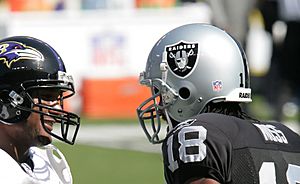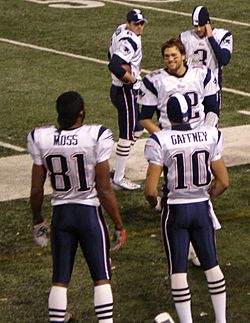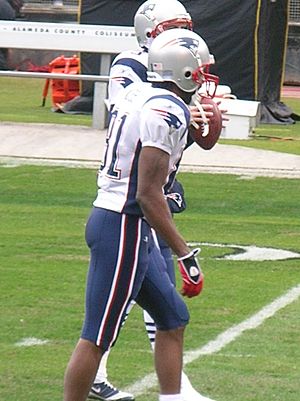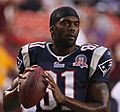Randy Moss facts for kids
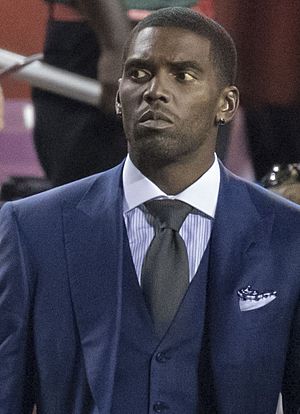
Moss in 2016
|
|||||||
| No. 84, 18, 81 | |||||||
|---|---|---|---|---|---|---|---|
| Position: | Wide receiver | ||||||
| Personal information | |||||||
| Born: | February 13, 1977 Rand, West Virginia, U.S. |
||||||
| Height: | 6 ft 4 in (1.93 m) | ||||||
| Weight: | 210 lb (95 kg) | ||||||
| Career information | |||||||
| High school: | DuPont (Dupont City, West Virginia) |
||||||
| College: | Marshall (1996–1997) | ||||||
| NFL Draft: | 1998 / Round: 1 / Pick: 21 | ||||||
| Career history | |||||||
|
|||||||
| Career highlights and awards | |||||||
|
|||||||
| Career NFL statistics | |||||||
|
|||||||
| Player stats at PFR | |||||||
|
Pro Football Hall of Fame
|
|||||||
|
College Football Hall of Fame
|
|||||||
Randy Gene Moss (born February 13, 1977) is a former American football player. He was a wide receiver in the National Football League (NFL) for 14 seasons. He played for the Minnesota Vikings, Oakland Raiders, New England Patriots, Tennessee Titans, and San Francisco 49ers. Many people think he is one of the greatest players ever.
Randy Moss holds the NFL record for most touchdowns caught in one season (23 in 2007). He also holds the record for most touchdowns caught by a rookie (17 in 1998). He ranks second all-time in career touchdown catches. He is fourth all-time in career receiving yards.
Moss was known for his amazing speed and ability to jump high. He often made spectacular catches even when defenders were right on him. The term "mossed" became a common phrase in football. It means when a receiver makes a great catch over a defender.
He played college football for the Marshall Thundering Herd. He was named an Unanimous All-American in 1997. Moss was chosen by the Minnesota Vikings in the first round of the 1998 NFL draft. He was named NFL Offensive Rookie of the Year.
In 2007, Moss joined the New England Patriots. He had an amazing season and set the record for total touchdown catches. He helped the Patriots have a perfect 16–0 regular season. After his playing career, he became a football analyst for ESPN. He was inducted into the Pro Football Hall of Fame in 2018.
Contents
- Early Life and High School Sports
- College Football Journey
- Professional Football Career
- NFL Records and Achievements
- Life After Playing Football
- Personal Life
- Images for kids
- See also
Early Life and High School Sports
Randy Moss was born in Rand, West Virginia. He went to DuPont High School. This school later joined with another to form Riverside High School. Randy was excellent in many sports there. He played football, basketball, baseball, and ran track. He was even on the school's debate team.
In football, Moss led the DuPont Panthers to state championships in 1992 and 1993. He was a star wide receiver. He also played free safety, returned kicks and punts, and was the team's kicker and punter. In 1994, he won the Harrison H. Kennedy Award. This award is for the best football player in West Virginia. Parade magazine named him one of the 50 greatest high school football players ever.
Moss was also a great basketball player. He was named West Virginia Player of the Year twice. In his senior year, he scored a school-record 1,713 career points. He also competed in track & field. At age 15, he was the West Virginia state champion in the 100 and 200 meters.
College Football Journey
Moss dreamed of playing for the Notre Dame Fighting Irish. He also thought about Ohio State. His half-brother, Eric, played there. Former Notre Dame coach Lou Holtz called Moss the "best high school football player I've ever seen." Florida State coach Bobby Bowden said Moss was as good as Deion Sanders.
Moss first signed to play with Notre Dame in 1995. However, he later transferred to Marshall University. Marshall was a Division I-AA school at the time. This allowed him to play right away.
Amazing Freshman Season (1996)
In 1996, Moss set many NCAA Division I-AA records. He had the most games with a touchdown catch in a season (14). He also tied Jerry Rice's record for most touchdown passes caught in a season (28). Moss gained 1,709 receiving yards, a record for a freshman.
The 1996 Marshall Thundering Herd went undefeated. They won the Division I-AA title. Moss caught four touchdowns in the championship game. This was Marshall's last season before moving to Division I-A.
Sophomore Success (1997)
In 1997, Marshall moved to Division I-A. Moss and quarterback Chad Pennington led a powerful offense. They helped the Thundering Herd win the Mid-American Conference title. Moss caught 26 touchdown passes that season. This was a Division I-A record at the time. He was also a first-team All-American.
In one game against Army, Moss had five catches for 186 yards and two touchdowns. One touchdown was a career-long 90-yard catch. He had four games with over 200 receiving yards in college. In one game against Ball State, he set a Marshall record with five touchdown catches.
Moss finished his college career having scored at least one touchdown in all 28 games he played. He won the Fred Biletnikoff Award as the best receiver. He also finished fourth in the voting for the 1997 Heisman Trophy.
Professional Football Career
Randy Moss decided to enter the NFL Draft after his sophomore year. He was expected to be picked very early. However, some teams were worried about his past. The Minnesota Vikings chose him with the 21st pick in the 1998 NFL draft. Moss had said that teams who passed on him would "regret it."
Minnesota Vikings: First Time (1998–2004)
1998: Rookie Sensation
In 1998, Moss helped the Vikings have an amazing offense. They set a record for scoring with 556 points. In his first NFL game, he caught two touchdowns. He had four catches for 95 yards.
In Week 5, on Monday Night Football, he had five catches for 190 yards and two touchdowns against the Green Bay Packers. On Thanksgiving Day, he had three catches for 163 yards and three touchdowns against the Dallas Cowboys. All three touchdowns were for over 50 yards.
The Vikings finished with a 15–1 record. They made it to the 1998 NFC Championship Game but lost. Moss was named to the Pro Bowl and earned first-team All-Pro honors. He won NFL Offensive Rookie of the Year for his rookie-record 17 touchdown catches. He also had 1,313 receiving yards.
1999: Continued Success
Moss had another great season in 1999. He caught 80 passes for 1,413 yards and 11 touchdowns. He also returned a punt for a touchdown. In Week 10, he had a career-high 204 receiving yards against the Chicago Bears.
The Vikings won their first playoff game against the Dallas Cowboys. Moss had five catches for 127 yards and a touchdown. They lost in the next round. Moss made his second straight Pro Bowl. He set a Pro Bowl record with 212 receiving yards and was named MVP.
2000: MVP Candidate
In 2000, quarterback Daunte Culpepper joined the team. His strong arm was perfect for Moss's deep catches. The Vikings started 7–0, and Moss was a top candidate for MVP. He finished the season with 1,437 yards and a league-leading 15 touchdown catches. He became the youngest and fastest player to reach over 3,000 yards and 45 touchdowns. He earned his third Pro Bowl trip.
2001–2004: Ups and Downs
Before the 2001 season, Moss signed a big 8-year, $75 million contract. He continued to have strong seasons, often catching over 1,000 yards and many touchdowns. In 2003, he had one of his best years. He caught 111 passes for 1,632 yards and 17 touchdowns. All three numbers were personal bests for him. He was named to his fifth Pro Bowl.
In 2004, Moss dealt with a hamstring injury. He still finished with 13 touchdowns in 13 games. In a playoff game against the Green Bay Packers, Moss made a memorable play. After scoring a touchdown, he pretended to "moon" the fans. This caused a lot of talk and he was fined. After the season, Moss was traded.
Oakland Raiders (2005–2006)
In 2005, Moss was traded to the Oakland Raiders. He changed his jersey number to 18. In his first game with the Raiders, he had five catches for 130 yards and a touchdown. He finished the year with 1,005 receiving yards.
Moss was not happy in Oakland. He felt the team was not winning enough. He openly said he wanted to play somewhere else.
New England Patriots (2007–2010)
In 2007, Moss was traded to the New England Patriots. He was very excited to join a team that could win the Super Bowl. He also looked forward to working with Coach Bill Belichick.
2007: Record-Breaking Season
Moss had an incredible season with quarterback Tom Brady. In Week 1, he had nine catches for 181 yards and a touchdown. He continued to have amazing games, often catching multiple touchdowns.
On December 29, 2007, the Patriots finished their regular season with a perfect 16–0 record. Moss caught two touchdown passes in that game, bringing his total to 23 for the season. This broke Jerry Rice's single-season record of 22 touchdown receptions. Tom Brady also broke a record with his 50th touchdown pass on the same play. Moss had 98 catches for 1,493 yards. He earned his sixth Pro Bowl selection.
The Patriots made it to Super Bowl XLII. Moss scored a touchdown late in the game. However, the New York Giants upset the Patriots, who lost their perfect season.
2008–2010: Later Patriots Years
Moss signed a new three-year contract with the Patriots in 2008. In the first game of the 2008 season, Tom Brady suffered a serious knee injury. Matt Cassel took over as quarterback. Despite this, Moss still caught 69 passes for 1,008 yards and 11 touchdowns.
In 2009, Moss caught a career-high 12 passes in the season opener. Coach Belichick said Moss was the "smartest receiver he's ever been around." Moss continued to climb the all-time touchdown list. He finished the season with 83 catches for 1,264 yards and 13 touchdowns.
In 2010, Moss felt he was not wanted by the Patriots. He was traded back to the Minnesota Vikings after four games.
Minnesota Vikings: Second Time (2010)
Moss returned to the Vikings in October 2010. However, his second time with the team was very short. He was released less than a month later.
Tennessee Titans (2010)
After leaving the Vikings, Moss was picked up by the Tennessee Titans. He played eight games with them, making six catches for 80 yards. He did not score any touchdowns. Moss finished the 2010 season with career lows in catches and yards. The Titans did not re-sign him.
San Francisco 49ers (2012)
After taking a year off in 2011, Moss announced he was ready to play again on his 35th birthday in February 2012. He signed a one-year contract with the San Francisco 49ers.
On September 9, 2012, Moss caught his 154th touchdown. This moved him past Terrell Owens for second place on the all-time receiving touchdown list. He finished the season with 28 catches for 434 yards and three touchdowns. Moss played in Super Bowl XLVII with the 49ers. They lost to the Baltimore Ravens. After this season, he retired from playing football.
NFL Records and Achievements
Randy Moss holds many impressive NFL records and achievements:
- Most touchdown receptions in a single season: 23 (2007)
- Most touchdown receptions by a rookie in a season: 17 (1998)
- Most seasons with 17 or more touchdown receptions: 3 (1998, 2003, 2007)
- Most seasons with 10 or more touchdown receptions: 9 (tied with Jerry Rice)
- Most games in a season with at least two touchdown receptions: 8 (2007)
- Most yards receiving in a Pro Bowl game: 212 (2000)
- Youngest player in NFL history to record his 100th receiving touchdown (29 years, 235 days)
- Fastest player to reach 5,000 career receiving yards: 59 games
- Highest career yards per catch average for any player with 900+ receptions: 15.6 yards per reception
- 6× Pro Bowl selection
- 4× First-team All-Pro selection
- Offensive Rookie of the Year (1998)
- NFL Comeback Player of the Year (2007)
- Member of the NFL 2000s All-Decade Team
- Member of the NFL 100th Anniversary All-Time Team
- Inducted into the Pro Football Hall of Fame in 2018
Life After Playing Football
After retiring from playing, Randy Moss became a football analyst. He worked for Fox Sports 1 and later for ESPN. He appeared on popular shows like Sunday NFL Countdown and Monday Night Countdown. In 2022, he left Monday Night Countdown.
Charity Work
Moss has always been involved in charity work, especially helping children. He often says he just wants to "see smiles." He has given clothes and food to families in need. He has also given free backpacks to school children. He even took children to amusement parks and NFL games.
In 2005, he hosted a fishing tournament to raise money for the Smile Network. This foundation helps children with mouth problems like cleft palate. The tournament's motto was "fish for a smile."
In 2008, Moss started the Links for Learning foundation. This foundation helps children in his home state of West Virginia. It aims to build learning centers for students who need them most.
Randy Moss Motorsports
In 2008, Moss announced he was starting his own auto racing team. It was called Randy Moss Motorsports. The team competed in the NASCAR Camping World Truck Series. The team reportedly closed in 2012.
Personal Life
Randy Moss's parents are Maxine Moss and Randy Pratt. He has a sister named Lutisia. His brother, Eric, also played briefly in the NFL. Randy Moss has five children: Sydney, Senali, Thaddeus, and Montigo. He is a Christian.
Health Update
In December 2024, Randy Moss shared that he was taking time off from ESPN to deal with a health issue. He encouraged other men to get regular checkups. Later, he revealed that he had undergone a procedure called a Whipple procedure to treat bile duct cancer. He announced that he is now a "cancer survivor."
Images for kids
See also
 In Spanish: Randy Moss para niños
In Spanish: Randy Moss para niños
 | Ernest Everett Just |
 | Mary Jackson |
 | Emmett Chappelle |
 | Marie Maynard Daly |


